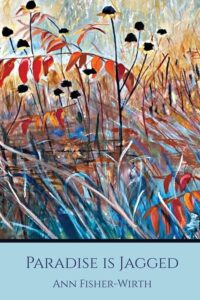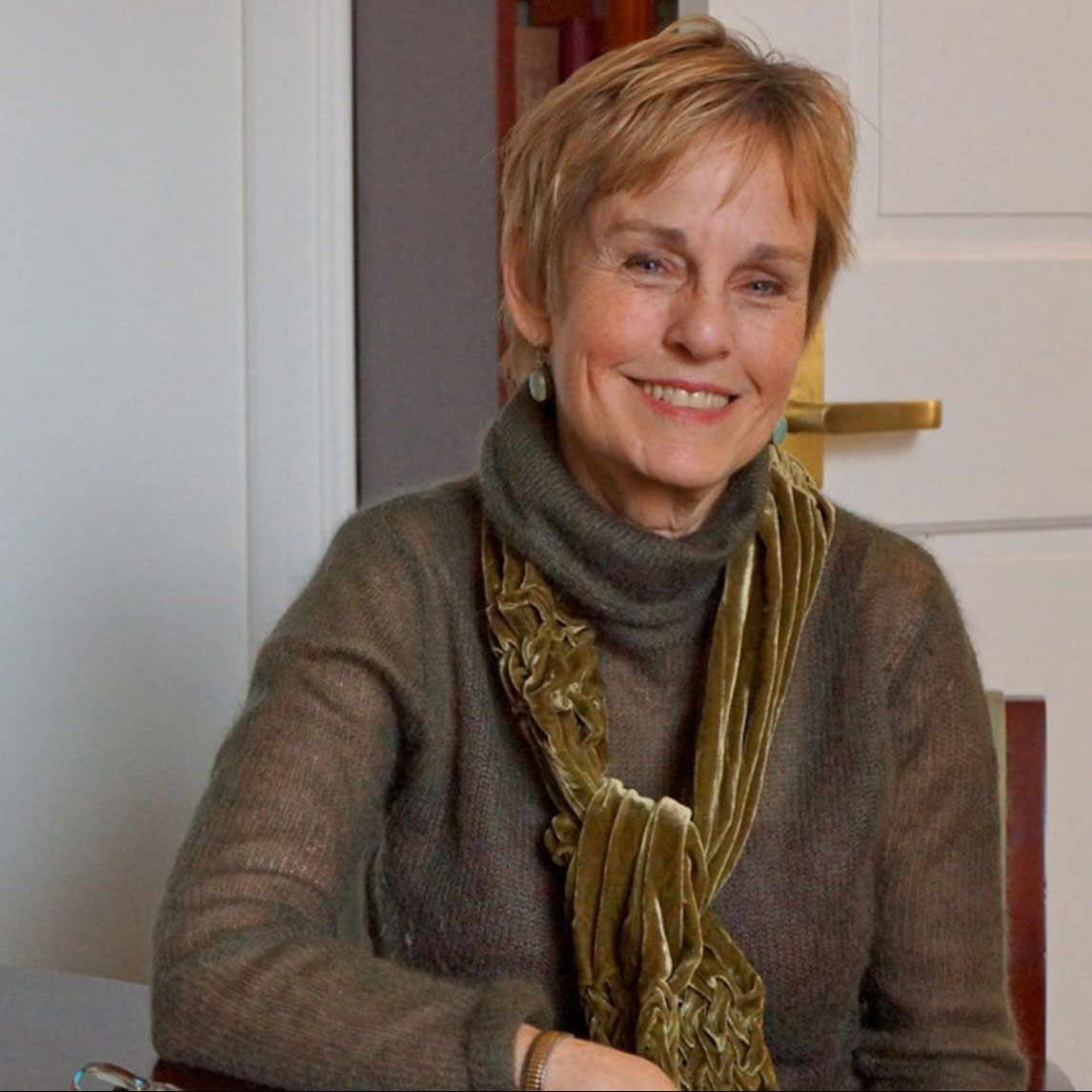Review by Merryn Rutledge

Paradise Is Jagged
ISBN: 978- 1947896604
2023, Terrapin Books
$17.00, 116 pages, paper
(sponsored post)
The five sections of the book form thematic clusters. Fisher-Wirth begins by introducing an overarching theme: death is woven into life. Her father died when she was a child; later, her beloved sister died. Too early, the child learns to fear death. Standing beside her father’s casket, the narrator says, “And I recall the chapel—my navy blue wool dress, / my fear to touch his face…” (“Ironing,” p. 16). Life’s effulgence only sharpens grief’s pain. In “Persimmons,” for example, “all of light in their red-orange flesh, / like breasts, like buttocks or wombs/ swollen with sun, with desire…” (p. 25) reminds the speaker of her dead sister, “gaunt edifice, cage of bone.” (“Inhabitation,” p. 24). Yet the poet affirms that “sometimes from the dark muck of suffering, joy rises…” (“Namesake,” p. 27).
The second section of the book celebrates life in “the clattering present.” (“Catalpa,” p.37). Dying is here a natural process: “everywhere rotting, everywhere teeming” (“Winter Day on the Whirlpool Trails” p. 33) in lines that sing with rhythm, alliteration, and internal rhyme, as in “leaf duff and dereliction” (p. 33) and “Redwoods / duff and crumble underfoot.” (“Meditation Facing into Rain,” p. 32).
Two new thematic threads emerge: the pestilence of racism and the degradation of our planet. In “at the Mississippi civil rights museum,” a golden shovel, the narrator sees how systemic racism “peels open” (p. 40) in museum exhibits. She also pays homage to Lucille Clifton, whose poem “miss rosie” gives Fisher-Wirth her golden shovel line endings.
…i stand
in this museum knowing that you lifted me up
and that you guide me still, through
what i have done and what i have failed to do, your
kindness…in the midst of so much cruelty… (43)
Just as racism wounds, so also is the natural landscape wounded by human agency. In “Late May” the narrator notes that “without people, / the sky is clean again.” (p. 35). Later, in “The Day Lays Down,” a vivid description of the Mississippi Delta ends abruptly with “a yellow crop duster gassing up, / getting ready to spray poison.” (p. 39).
The poet attests to racism most strongly in section III, “The Astonishing Light,” a long poem about Fisher-Wirth’s experiences teaching in Parchman, the Mississippi State Penitentiary, where “some were sentenced for no worse / than what the frat boys on my campus do at parties.” (p. 49). The narrator wishes she could “think about things other than /white supremacy…systemic undereducation, racial profiling,/ the carceral state, the legacy of slavery” (p. 49), but by making (and italicizing) this list, the poet insures that we remember lives “struggling for light” (p. 49) in destructive systems.
Poems in the final two sections, while still vivid with description, assume a more meditative tone. Still pondering her sister’s death, the poet reflects on the strangeness of “what fades, what stays.” (“Thum,” p. 71). As she herself ages, Fisher-Wirth concludes that “the dance of all this dying, / all this grieving” (p. 72) is
like prana moving through us
like those swaying branches
in midsummer,
Mississippi, where at night
the vast trees throb with cicadas’ silver music. (72)
In “Costa Rica,” a prose poem about her volunteer work there, the narrator reflects, “we pass, we pass, we will never be here again” (p. 64) while the natural surroundings will remain, albeit “always dying, always growing.” (p. 64). Here impermanence is mystery and grace. “We exist by grace/ or chance in the free fall of every moment…” (“Pecans,” p. 81). Old age brings hurts, lasting love, fatigue, and small pleasures: “Dailiness carries me, the small blessings of work/ exhaust me, and evening comes” (“Visitation,” p. 84)—that final phrase echoing Jane Kenyon’s litany of acceptance in “Let Evening Come.”
As this lovely collection draws to a close, the jagged paradise has revealed itself in lives made jagged by loss, systemic “isms,” marred landscapes, and distant loved ones. And yet,
“Il y a longtemps que je t’aime,” (“Jagged Paradise” (90) the aging narrator whispers to her beloved husband—as to life: I have loved you a long time. “We love/ things we love/ for what they are, wrote Frost.” (90) Don’t just take my word for it, wise woman Fisher-Wirth implies by nodding to another sage.
The poet bookends her collection by blessing her readers. In the first poem, which serves as epigraph for the book, she prays that “Whoever you are, may you be at peace/ in this great silence, where only the birds speak.” (“A Young Stag at Dusk” (4) The final poem, “Thich Nhat Hanh, or Thay”, is a benediction, in which all of us are “wrapped in his [the monk’s] blessing, merciful as the rain.” (94) One leaves Paradise Is Jagged as one leaves a meditation, with renewed awareness of grace.
Published in Cider Press Review, Volume 25, Issue 6.
See all items about Merryn Rutledge
Visit Merryn Rutledge’s contributors page.
See all items about Ann Fisher-Wirth
Visit Ann Fisher-Wirth’s contributors page.


 Merryn Rutledge’s poems have appeared widely throughout the world in journals and anthologies. Her collection Sweet Juice and Ruby-Bitter Seed is available from Kelsay Books. Merryn enjoys teaching poetry craft, reviewing poetry books by women (Tupelo Quarterly, Pedestal, and elsewhere), singing, dancing, and working for social justice causes. Merryn holds two degrees in literature. Writing poems is a third vocation, after teaching literature, film studies, and creative writing at Phillips Exeter Academy, and then, with a doctorate in leadership, running a leadership development consulting firm. During that career phase, Merryn’s field research on leadership was published as books, chapters, and in peer reviewed journals. Merryn lives near Boston, MA.
Merryn Rutledge’s poems have appeared widely throughout the world in journals and anthologies. Her collection Sweet Juice and Ruby-Bitter Seed is available from Kelsay Books. Merryn enjoys teaching poetry craft, reviewing poetry books by women (Tupelo Quarterly, Pedestal, and elsewhere), singing, dancing, and working for social justice causes. Merryn holds two degrees in literature. Writing poems is a third vocation, after teaching literature, film studies, and creative writing at Phillips Exeter Academy, and then, with a doctorate in leadership, running a leadership development consulting firm. During that career phase, Merryn’s field research on leadership was published as books, chapters, and in peer reviewed journals. Merryn lives near Boston, MA. Ann Fisher-Wirth’s seventh book of poems, Paradise is Jagged, appeared from Terrapin Books in February 2023. Her sixth book of poems is The Bones of Winter Birds (Terrapin Books, 2019). Her fifth book, Mississippi, is a poetry/photography collaboration with Delta photographer Maude Schuyler Clay (Wings Press, 2018). Her other books of poems are Dream Cabinet, Carta Marina,Blue Window,andFive Terraces, and the chapbooks The Trinket Poems,Walking Wu-Wei’s Scroll, andSlide Shows. With Laura-Gray Street she coedited The Ecopoetry Anthology, published by Trinity University Press early in 2013; a third edition appeared in January 2020. Ann and Laura-Gray have begun work on The Ecopoetry Anthology: Volume II, which will contain poems written since 2010 by poets who were not included in the first volume; it will appear from Trinity UP in 2025.
Ann Fisher-Wirth’s seventh book of poems, Paradise is Jagged, appeared from Terrapin Books in February 2023. Her sixth book of poems is The Bones of Winter Birds (Terrapin Books, 2019). Her fifth book, Mississippi, is a poetry/photography collaboration with Delta photographer Maude Schuyler Clay (Wings Press, 2018). Her other books of poems are Dream Cabinet, Carta Marina,Blue Window,andFive Terraces, and the chapbooks The Trinket Poems,Walking Wu-Wei’s Scroll, andSlide Shows. With Laura-Gray Street she coedited The Ecopoetry Anthology, published by Trinity University Press early in 2013; a third edition appeared in January 2020. Ann and Laura-Gray have begun work on The Ecopoetry Anthology: Volume II, which will contain poems written since 2010 by poets who were not included in the first volume; it will appear from Trinity UP in 2025.


